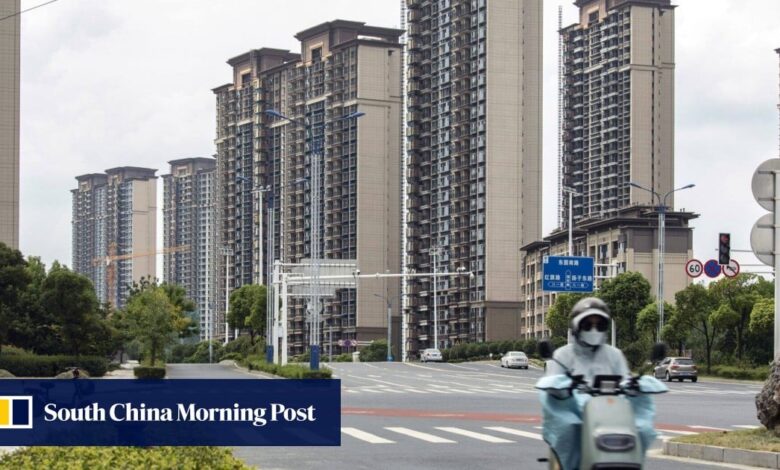China’s top-500 list of private firms is missing some big names, as profits fell and property developers tanked

[ad_1]

China’s de facto chamber of commerce – which acts as a bridge between private firms and Beijing – has released its list of the nation’s top-500 private enterprises, and it shows how former titans of industry were dethroned amid plunging profits and investments in the waning months of the pandemic.
The annual rankings, compiled by the government-backed All-China Federation of Industry and Commerce, also help illustrate just how badly the country’s crisis-plagued property developers have been hit.
Large private developers lost a combined 35.56 billion yuan (US$4.88 billion) last year, and only 17 made this year’s top-500 list, compared with 25 last year. One of the most debt-laden developers, Evergrande, has been off the list since 2021.
The semi-official list’s release comes amid a spate of subpar economic data, weakened investor confidence and policy uncertainties in the rapidly changing landscape of the world’s second-largest economy.
Coming in at No 1 on the list, e-commerce giant JD.com posted operating revenue of 1.05 trillion yuan (US$144 billion) last year – a 9.9 per cent increase from 2021. At No 2 is Alibaba, which owns the Post, and at No 3 is petrochemical giant Hengli.
Death and debt in China: when bankruptcy is off the table, so are fresh starts
Death and debt in China: when bankruptcy is off the table, so are fresh starts
Notable stand-outs that did not participate in the annual assessment include tech giant Huawei Technologies, which faces sanctions from the US and had ranked fifth in 2021, as well as financial services provider Ping An Insurance and struggling developer Country Garden.
Making the list required operating revenue of at least 27.578 billion yuan in 2022 – up 1.211 billion yuan, year on year.
The combined operating revenue of China’s top-500 private firms reached 39.83 trillion yuan in 2022, up 3.94 per cent from 2021.
However, their combined net profits after taxes reached only 1.64 trillion yuan, down 4.86 per cent compared with the previous year, and 38 firms on the list reported a post-tax loss, up from 16 in 2021.
The growth seen among the largest private companies was largely due to their engaging in price wars to gain more market share, an unidentified representative from the commerce chamber reportedly told financial media outlet Caixin.
“Their growth may imply smaller enterprises losing their income,” the source reportedly said.
Among all private developers, Vanke – which is 27.8 per cent owned by the state-run Shenzhen Metro Group – reported the most revenue, securing eighth place on the list.
Ding Changfa, an associate professor of economics at Xiamen University, said the revenue of developers could be falling amid funding difficulties and waning demand.
“Young people are the main force in purchasing real estate, creating what is known as rigid demand,” he said. “However, with the ageing population and a continuous decline in the number of young people, there will certainly be a trend of diminishing demand in the future.”
The private economy, including about 47 million registered private firms and more than 100 million self-employed businesses, has been a critical cog in China’s 121-trillion-yuan (US$18 trillion) economy, accounting for more than half of all tax revenue, 60 per cent of gross domestic product, and more than 80 per cent of urban jobs.
However, it was hit hard in the past three years amid stringent Covid-control measures, as well as government regulatory crackdowns, as seen in internet platforms and private tutoring services.
Why China cracked down on education, upending a US$70 billion industry
Why China cracked down on education, upending a US$70 billion industry
But Beijing has stepped up efforts in recent months to make the private economy “bigger, better and stronger” like state-owned players, launching a 31-point action plan and also setting up a new bureau under the nation’s top economic planner to coordinate policy support.
Still, most private giants are concentrated in manufacturing sectors, including steel, non-ferrous metals, chemicals and energy, and there is also a heavy presence of information technology and internet services.
Less private capital has also been flowing into finance, a state-dominated sector that faces heavy de-risking. Taikang Insurance Group is the largest private financial firm, ranking 24th on the list.
Geopolitical conflicts and pandemic controls also accompanied a slowdown in private enterprises’ overseas expansions. Last year, only 188 firms on the list pursued overseas investments – a 20 per cent decline from 2021.
Meanwhile, fewer of China’s private firms, just 148, opted to participate in the Belt and Road Initiative – Beijing’s push to link economies into a China-centred trading network – marking a 24 per cent annual drop.
[ad_2]
Source link





